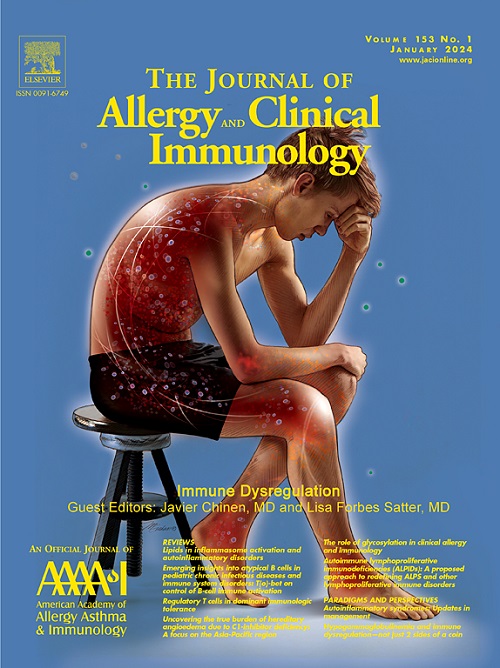抗 OX40 配体抗体阿米替利单抗治疗中重度特应性皮炎患者的 2b 期随机临床试验。
IF 11.4
1区 医学
Q1 ALLERGY
引用次数: 0
摘要
背景:阿利替单抗是一种靶向抗原递呈细胞上OX40配体的全人源非消耗性单克隆抗体,可预防特应性皮炎(AD)中出现的T细胞驱动的炎症:本试验评估了阿米替利单抗在成人特应性皮炎患者中的疗效和安全性:在这项由两部分组成的2b期随机双盲安慰剂对照试验(NCT05131477)中,患者在第1部分(1:1:1:1:1随机化)中每4周接受一次皮下注射阿利替尼,剂量为250毫克(含500毫克负荷剂量)、250毫克、125毫克或62.5毫克,或安慰剂,共24周。在第2部分中,临床应答者按3:1重新分配,撤销阿米利单抗或继续之前的剂量方案治疗28周。主要终点是湿疹面积和严重程度指数(EASI)从基线到第16周的变化百分比:第一部分和第二部分分别有 390 名和 190 名患者入组。与安慰剂相比,阿米替利单抗的湿疹面积和严重程度指数(EASI)有显著的百分比变化(80%的患者在第52周之前的数周内血清阿米替利单抗浓度低于4微克/毫升的阈值)。AD相关生物标志物在第1部分的降低一直持续到第2部分。52周内,阿利替尼单抗的耐受性良好:结论:阿尼替单抗治疗可明显降低临床和生物标志物反应,且成人AD患者在第52周内耐受性良好。大多数患者在停用阿利替单抗28周后仍能观察到持续反应。本文章由计算机程序翻译,如有差异,请以英文原文为准。

Phase 2b randomized clinical trial of amlitelimab, an anti-OX40 ligand antibody, in patients with moderate-to-severe atopic dermatitis
Background
Amlitelimab, a fully human nondepleting mAb targeting OX40 ligand on antigen-presenting cells, could prevent T-cell–driven inflammation seen in atopic dermatitis (AD).
Objective
This trial evaluated the efficacy and safety of amlitelimab in adults with AD.
Methods
In this 2-part, phase 2b, randomized, double-blinded placebo-controlled trial (ClinicalTrials.gov identifier NCT05131477), patients received subcutaneous amlitelimab every 4 weeks at doses of 250 mg plus a 500-mg loading dose, 250 mg, 125 mg, or 62.5 mg or placebo for 24 weeks in Part 1 (1:1:1:1:1 randomization). In Part 2, clinical responders were reallocated 3:1 to stop taking amlitelimab or continue the previous dose regimen for 28 weeks. The primary end point was percentage of change in Eczema Area and Severity Index (EASI) from baseline to week 16.
Results
In all, 390 and 190 patients enrolled in Part 1 and Part 2, respectively. A significant percentage of change decrease in EASI was observed with amlitelimab doses versus with placebo (P < .001). Clinical responses at week 24 (Investigator Global Assessment 0/1 and/or a 75% reduction in EASI) were maintained at week 52 in patients continuing or stopping amlitelimab. Of the patients maintaining clinical response at week 52 after no longer receiving treatment, more than 80% had serum amlitelimab concentrations less than the 4-μg/mL threshold for several weeks before week 52. Reductions in AD-related biomarkers during Part 1 were maintained through Part 2. Amlitelimab was well tolerated over 52 weeks.
Conclusions
Amlitelimab treatment significantly reduced clinical and biomarker responses, and was well tolerated in adults with AD through week 52. Sustained responses were observed in the majority of patients for 28 weeks after they had stopped taking amlitelimab.
求助全文
通过发布文献求助,成功后即可免费获取论文全文。
去求助
来源期刊
CiteScore
25.90
自引率
7.70%
发文量
1302
审稿时长
38 days
期刊介绍:
The Journal of Allergy and Clinical Immunology is a prestigious publication that features groundbreaking research in the fields of Allergy, Asthma, and Immunology. This influential journal publishes high-impact research papers that explore various topics, including asthma, food allergy, allergic rhinitis, atopic dermatitis, primary immune deficiencies, occupational and environmental allergy, and other allergic and immunologic diseases. The articles not only report on clinical trials and mechanistic studies but also provide insights into novel therapies, underlying mechanisms, and important discoveries that contribute to our understanding of these diseases. By sharing this valuable information, the journal aims to enhance the diagnosis and management of patients in the future.

 求助内容:
求助内容: 应助结果提醒方式:
应助结果提醒方式:


